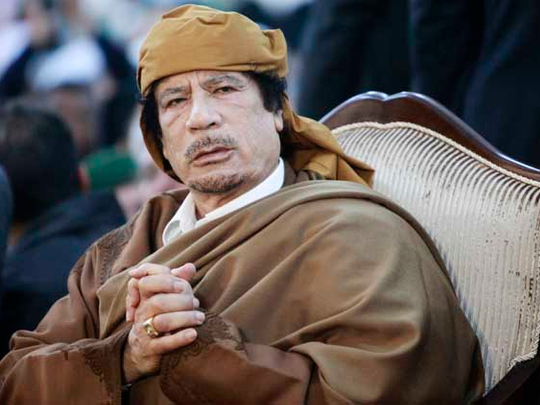
Muammar Gaddafi reportedly went into severe depression when his long-time friend and colleague, Saddam Hussain, was toppled by US troops in 2003. Gaddafi's U-turn was quick — he immediately opened his country to United Nations inspectors, turned a new page with the US, and formally took the blame for the infamous 1988 Lockerbie bombings, agreeing to pay up to $2.7 billion (Dh9.90 billion) to the families of the 270 victims.
The same cannot be said for the more than 200 Libyan citizens who were murdered in cold blood over the past week of demonstrations that have swept Libya, picking up a contagious momentum that started in Tunisia last January.
If the lives of the Lockerbie victims were worth nearly $10 million each, those of Gaddafi's own citizens are seemingly worth nothing — as far as the Libyan leadership is concerned.
Gaddafi, strangely enough, did not see it coming and still refuses to believe that his time has run out. When addressing the people of Tunisia days after Zine Al Abidine Bin Ali — another friend and colleague — was toppled from the presidency by a popular revolt in January, Gaddafi said that such things don't happen in Libya "because people are the ones who govern!"
It was a classic case of a leader blinded by power, who has been around for too long, and who seemingly believes the many stories, or should we say lies, that he has fed his people for 42 unbearable years.
One of them is that he is not president of Libya, but "Big Brother Muammar". Another is that Libya is a democracy that is run by the people, known as popular committees.
The 69-year-old Gaddafi also probably believed that after restoring his relations with the US, portraying himself as a strategic ally in the war on terror after 9-11, and silencing all opposition at home, it was impossible for an ‘Egypt scenario' to be repeated in Libya.
When it did, Gaddafi showed his true colours, this time, refusing to believe that it was ‘Game over Brother Muammar'.
The images coming out of Libya — where there is no international media covering the massacre — are horrendous. What is uglier than the bloodbath is the haunting silence of Libyan officialdom.
Over 200 people have reportedly been killed and the local morgue in Benghazi and Al Bayda can no longer accommodate the rising death toll. Prisons have been invaded in the chaos, and thousands of criminals have been set free to loot Libyan homes.
Gaddafi has hired African mercenaries to come and kill his own countrymen, and is already using all kinds of weapons, ranging from machine guns on helicopters to cannon fire, to kill young Libyans.
He has cleaned gasoline out of Benghazi to make sure that demonstrators cannot commute to Tripoli. The waters of Benghazi have reportedly been contaminated by his men, and there is a fear he will resort to chemical weapons against groups that have taken the name ‘Grandsons of Omar Al Mukhtar'.
Gaddafi cannot understand how much the world has changed since he came to power four decades ago, and yet, how some things never change. It was street power, after all, that helped him bring down the ageing monarch Idris II back in 1969. The young demonstrators he is killing today are of the same age he had been (only 27) when he decided to impose "regime change" on his country.
The young men and women back then and now, are fed up with nepotism, corruption, and autocracy. Bin Ali tried to silence the demonstration by force but fell 29 days later. Former Egyptian president Hosni Mubarak — yet another Gaddafi friend and colleague — lasted for only 18 days.
What Gaddafi is probably thinking is that he can muscle down the Libyan street, forcing it into submission if maximum pain is inflicted on anybody who opposes him.
Gaddafi probably thinks that after surviving the April 1986 US raid on Libya, where many civilians were killed (including his adopted daughter), and the gripping sanctions of the 1990s, he can probably survive anything else.
The man has survived every US president since Richard Nixon, and if people thought Mubarak had been around for way too long, Gaddafi has outlived three Egyptian presidents.
Gaddafi has recently been re-branded as a "friend of the West" receiving former British prime minister Tony Blair, French President Nicolas Sarkozy, Italian Prime Minister Silvio Berlusconi, and former US secretary of state Condoleezza Rice.
He has failed to digest that western friendships do not really matter when the curtain falls. The adventurer in him — who refuses to cope with changes of the 21st century — will probably stay in power until either arrested in a military coup or harmed by a Libyan demonstrator, who one day, may storm his palace — as the 1958 case of Iraq's prime minister Nouri Al Said being murdered by the mob.
He will continue to fire until then, regardless of the death toll or public opinion, and will never flee like Bin Ali, or resign like Mubarak.
Sami Moubayed is editor-in-chief of Forward magazine in Syria.









